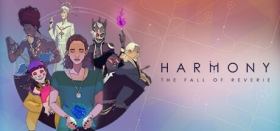
What Sets Harmony: The Fall of Reverie Apart
As the game is still in its infancy after release, it is worth noting that this article is entirely spoiler-free, aside from information readily available on the store page, I will only be mentioning my experience with the mechanics rather than individual story elements.
Harmony: The Fall of Reverie is a story-rich title that plays a lot like a visual novel — you are going to spend hours reading through text and learning about this new world as you unravel an overarching narrative. While I was able to note a lot throughout my review of the game, I wanted to give focus on the game's unique aspects without having to mention other areas — why it stands out from a sea of other games like itself, even among others within DON'T NOD's own repertoire of titles.

When I first started Harmony: The Fall of Reverie, I was cautiously optimistic about the premise. Having come from my latest and favourite choices matter/story-rich title — I Was a Teenage Exocolonist — I was intrigued by the potential similarities between these games And although I didn't exactly get I Was a Teenage Exocolonist 2.0, what I got was more than I expected; it was different but still good.
The journey starts off rather quickly despite its slow beginning throughout the entirety of Act 1 — you are introduced to the main elements of the game in what seems like a flash, and then the rest of the opening plays as a tutorial for the Augural. While it is slow every time you encounter it — from the very first implementation to replays thereafter — the drawn-out pacing of the first Act is a forgivable downfall for the system that it later introduces and becomes the game's central premise: being able to see the future.

The Augural becomes your guiding light and your dearest foe throughout the rest of the game, as the gift of precognition isn't one to take lightly. You see, throughout the five-act experience, Harmony: The Fall of Reverie gives you crucial information no other title of its genre dares to: it tells you exactly what will happen in every Act. From the conclusion to each individual chapter to even the conclusion to the Act itself, as Harmony, the goddess-like entity of the Oxion culture, you are blessed with information to wield at your heart's desire.
Except, it ultimately ends up being a curse.
Clarity and being a Prescient — as it is called in-game — may give you a bit of a headstart at knowing what you will be facing. Keen players will be able to deduce individual chapters by peering into the future; what the game doesn't tell you is that it isn't about the destination, but instead, it's the journey. Throughout the game, I decided to make the most of this unique ability that I was offered by DON'T NOD and peer into the future at will — after all, no other title ever gives you that sense of agency without a caveat.

As I played each chapter and advanced throughout the story, I started learning something: I may know how each interaction can conclude, but I didn't know how, throughout talking to each of the characters, their thoughts and actions would affect my ultimate decision. In my playthrough, I found myself second and third guessing my choices — both the ones I'd done and the ones I was yet to. There were moments when the way characters spoke to Polly and interacted with one another that sat me down and forced me to re-evaluate my path and reconsider my options, despite how smug and determined I was at the beginning.
Every story-rich title that is entirely focused on the narrative needs to find a way to set itself apart, and the way Harmony: The Fall of Reverie masterfully does this is by offering you something no other game ever has: the truth. In a strange twist of fate, your own bias, opinions, and preconceived notions of characters and plot points force you into the shoes of the unreliable narrator, forcing you to second-guess your own decisions and abruptly change the narrative, despite knowing how it will unfold several minutes — at times, even hours — before it does.

There aren't any nefarious twists and turns that break continuity; DON'T NOD does not break outside of the lore and rules it has set for itself. The nodes do exactly what they say, the story events happen exactly as they are explained, and the player is the only wild card in the equation.








COMMENTS